Search Results
Showing results 1 to 20 of 75
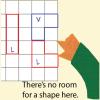
Fill It Up
Source Institutions
Players take turns adding shapes made of three squares to a grid. They try to fit their shapes on the grid in a way that blocks the other player.
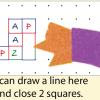
Dots to Squares
Source Institutions
As learners play this strategy game, they develop understanding of squares, area, and perimeter. On each turn, a player draws a line between two dots next to each other on the grid.
Stacking Dice
Source Institutions
In this math game, learners try to earn the most points by winning stacks of four dice. Learners practice number recognition and addition skills.
What's the Difference?
Source Institutions
In this sorting activity, learners play a game in which they try to identify the largest number of differences between two objects.
Spin to Win!
Source Institutions
In this math activity, learners play a probability game and try to be the first to get to the end of the game board path .This activity guide contains a material list, black line masters for the game
Pass or Roll!
Source Institutions
In this math activity, learners play a game in which every roll can earn you counters, but if you roll the wrong number (6), you have to put everything back.
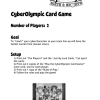
CyberOlympic Card Game
Source Institutions
In this Cyberchase activity, learners use numbers to create CyberOlympic teams with the fastest times.
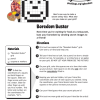
Boredom Buster
Source Institutions
In this Cyberchase activity, use grid coordinates to share secret pictures with a friend. Color squares of a grid to make a picture (like a smiley face) that you keep hidden from the other person.
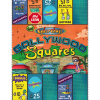
Gollywood Squares Game
Source Institutions
In this Cyberchase activity, roll the die and count off spaces on the game board to earn money and collect CyberSquad autographs. To win the game, be the first to buy four different autographs.
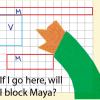
Twelve at a Time
Source Institutions
As learners play this game, they build skills in area, perimeter, multiples and factors. They take turns making rectangles with 12 squares on the grid.
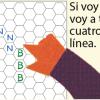
Cuatro en Línea
Source Institutions
¡Este juego de estrategia tiene reglas sencillas pero puede ser un reto! Los jugadores empiezan con una red de hexágonos vacía. En su turno cada jugador pone su inicial en un hexágono vacío.
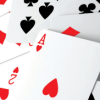
Odd Man Out
Source Institutions
In this math game (Page 14 of the Are You Game? PDF), learners determine the probability of getting an even versus an odd product using the numbers on a regular deck of cards.
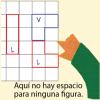
Rellénelo
Source Institutions
Los jugadores toman turnos para añadir figuras de tres cuadrados a la cuadrícula. Intenten encajar sus figuras en la cuadrícula de modo que bloquee al otro jugador.
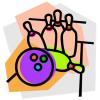
Strike 'em Down & Add 'em Up!
Source Institutions
In this activity, reuse two-liter bottles to create bowling pins. Learners practice math skills and develop a concept of verifying answers, while bowling and keeping score.
Wheel of Fitness
Source Institutions
In this fun activity for any size group, early elementary learners complete physical challenges while playing a game. Learners add new challenges to the "wheel of fitness" that they want to try.
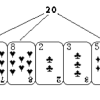
Ten, Twenty, Thirty
Source Institutions
This game for one to four players uses a deck of cards to develop mental addition skills.
What's in the Bag?
Source Institutions
In this activity, young learners use their sense of touch rather than sight to identify a mystery object in a bag. Learners take turns acting as "peekers" and "sensers" throughout the game.

The Gator Pie Game
Source Institutions
In this activity, learners explore fractions as they help gators share pies.
Frustrations with Fractions
Source Institutions
In this math activity, learners make a set of fraction cards to play a game that will help relieve their fraction frustrations.
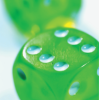
Race to the Top
Source Institutions
In this math game (Page 6 of the Are You Game? PDF), learners examine the probability of rolling sums from 0 to 12 with two dice. The first player to reach the finish line is the winner.
